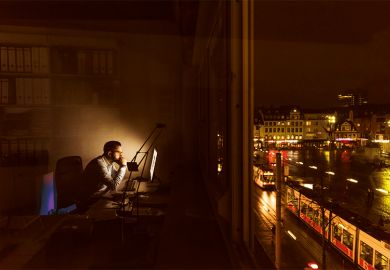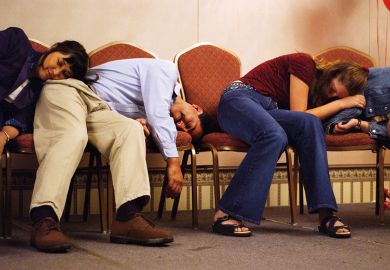Researchers may be hoping to return to work feeling refreshed after relaxing Christmas breaks. But it is more likely that they will not have taken proper holidays, a study suggests.
Australian researchers have quantified the extent to which academic work intrudes on leisure time by analysing how many papers and peer reviews are submitted outside business hours.
The study, published in The BMJ, analysed when some 49,000 journal articles and 76,000 peer reviews had been submitted to the journal and its sister publication The BMJ Open over a seven-year period.
Overall, some 14 per cent of journal manuscripts were submitted over weekends and 9 per cent during holidays. The study found stark differences between nationalities, with Chinese academics easily the most likely to submit work on the weekend, followed by their neighbours in Taiwan and South Korea.
Belgian, German and Swiss academics proved most partial to emailing papers and reviews on holidays. Scandinavians were among the least likely to submit work out of hours.
“The differences between countries suggest that a ‘culture of overwork’ is a literal thing, not just a figure of speech,” said lead author Adrian Barnett, a statistician at Queensland University of Technology.
The researchers acknowledge that they were unable to establish exactly where academics were – and consequently, which time zone they were operating in – when they submitted their work.
The study also highlights that submitting a manuscript is “the final step in an often long process” and therefore, “even when it is submitted out of hours, the bulk of the thinking and writing may have been done during working hours”.
But the researchers were surprised to find that the study results were consistent not only within countries, but also over time.
The paper also plots when academics from different countries were likely to submit journal articles. Those from China tendered many articles just after midnight, with Brazilians’ favoured time an hour or two later.
Scandinavians and North Americans preferred morning work hours. Australians, New Zealanders, Britons and Germans opted for the early afternoon, while the French, Italians and Spanish gravitated to the evening.
Digital technology’s enabling of writing “anywhere, anytime” means work can easily invade leisure time, the paper says. But the findings also suggest that researchers may be “time-shifting important tasks to quieter times and spaces”.
“The creative work of writing a paper may be easier to do at the weekend,” the paper muses. “[It] may be something that many researchers enjoy.”
The paper does not indicate what time the author submitted it, so Times Higher Education asked Professor Barnett in an out-of-hours email.
The answer: 10pm. “I worked on this paper on the triumvirate of weekends, late nights and holidays,” Professor Barnett added. “But this was a fun paper, so it wasn’t so bad.”
POSTSCRIPT:
Print headline: Sundays spent sending papers?
Register to continue
Why register?
- Registration is free and only takes a moment
- Once registered, you can read 3 articles a month
- Sign up for our newsletter
Subscribe
Or subscribe for unlimited access to:
- Unlimited access to news, views, insights & reviews
- Digital editions
- Digital access to THE’s university and college rankings analysis
Already registered or a current subscriber?










